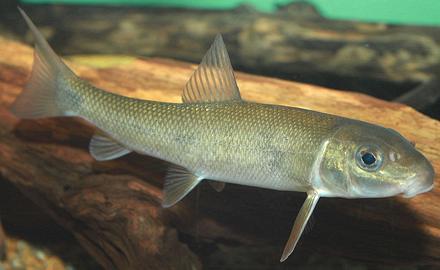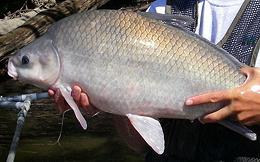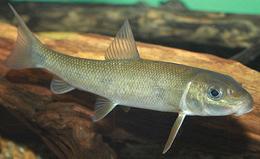 [family Catostomidae]
[family Catostomidae]
This family, related to Carp in order Cypriniformes, contains about 78 species, all except two confined to North America. They are small fish, most averaging about 12 inches, except the Buffalo Fish. While several species other than the Buffalos are eaten as incidental catches, only a few have any commercial value or potential. They are most used as bait for catching the large predator fish that prey on suckers. Photo by Brian Gratwicke distributed under license Creative Commons Attribution 2.0 Generic.
More on Varieties of Fish
(very large page).
 [Smallmouth Buffalo Ictiobus bubalus -also-
Bigmouth Buffalo Ictiobus cyprinellus, Black Buffalo
Ictiobus niger]
[Smallmouth Buffalo Ictiobus bubalus -also-
Bigmouth Buffalo Ictiobus cyprinellus, Black Buffalo
Ictiobus niger]
Of the three Buffalo Fish, the Smallmouth is of greatest commercial interest. It is already one of the most sold freshwater fish in North America and appears to be quite suitable for aquaculture. It can grow to about 40 inches and 80 pounds, but is commonly 24 inches. A bottom feeder, it lives on a wide variety of foods including algae, crustaceans, mollusks and insect larvae. It is widespread through the Mississippi drainage basin and other river systems in North America, and has recently been found in California aqueducts.
Buffalo Fish flesh is white and mild, but like Carp, the flesh of the Buffalo Fish is shot through with thread bones. While the rest of the world has learned to deal with these at the table, most North Americans have not. For this reason, the most eaten part is the rib cage, cut into strips parallel to the ribs and deep fried. Personally, I always eat fish breaking it up with pointy chopsticks, so I can see and remove most bones easily.
Caution: Occasionally, people have come down with
Haff Disease, a potentially deadly poisoning, from eating Buffalo
Fish from some areas, though it is more common from Crayfish. While
it is a serious condition, most victims recover completely. This
toxin is thought to come from Water Hemlock roots consumed by the
fish.
Photo by U.S. government = public domain.
 [Catostomus commersonii -also- Northern Hogsucker
Hypentelium nigricans (smaller)]
[Catostomus commersonii -also- Northern Hogsucker
Hypentelium nigricans (smaller)]
The White Sucker is very widespread in North American rivers, from
North Carolina to Alaska. It can grow to 25 inches and over 6 pounds,
but is commonly 16 inches. It is a minor commercial catch and farmed
to some extent. It (and the Hogsucker) are often caught by "Gigging"
(spearing) at night aided by lights. Like all fish of the Carp family,
the flesh of this fish is shot through with thread bones that most
North Americans have not learned to deal with at the table. Fillets
of this fish being fairly small, a common strategy is to score
partially through the flesh at less than 1/2 inch intervals deep
enough to cut the thread bones. These will then be exposed to hot
oil during frying and crisped into edibility.
Photo by Brian Gratwicke distributed under license
Creative Commons
Attribution 2.0 Generic.